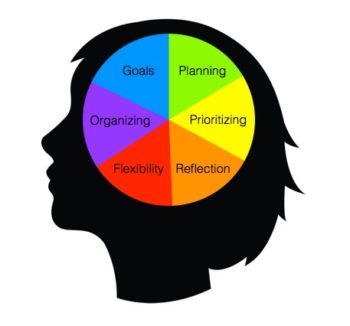Executive Skills and Reading Comprehension

The role of executive functioning in learning has been researched for many decades, and we now know that executive skills play important roles in literacy learning, and especially in successful reading comprehension. I recently finished a book by Kelly Cartwright, Executive Skills and Reading Comprehension: A Guide for Educators (2015, Guilford Press) that explores this connection in detail and provides suggestions for supporting students who have weak executive skills.
Cartwright explains:
“Children who have difficulties with reading comprehension, despite having age-appropriate word reading skills, have lower levels of executive skills than their peers with better comprehension. These discoveries are important for all educators because reading comprehension is the foundation for all other learning in school: students cannot understand, enjoy, or respond to literature without effective reading comprehension; likewise, students cannot gather new information from science, math, or social studies texts when they don’t understand what they read. (p.3)”
What are executive function skills and how do they support reading comprehension?
Cartwright suggests we think of the term executive skills as an umbrella term that refers to a set of mental tools we use to manage tasks and achieve goals, and that these skills can be grouped into three core areas: cognitive flexibility, working memory, and inhibition.
Executive skills involve regulating one’s own thinking to achieve desired goals. Cartwright notes that “Executive skills emerge early in life and develop across childhood and beyond. Even in very young students, executive skills enable the self-control that is necessary to remember classroom routines, pay attention to a teacher’s direction, and inhibit inappropriate behaviors.”
Here is a summary of how these core skills affect reading comprehension (p. 8-9):
- Cognitive Flexibility: is the ability to shift attention from one activity to another or to actively switch back and forth between important components of a task. When reading, skilled comprehenders actively shift focus between many things, such as word and text meanings, letter-sound information, and syntactic (sentence grammar) information.
- Working Memory: is the capacity for holding information in mind while working with part of that information. When building text meaning, a good comprehender must keep in mind the various text ideas presented, note the causal links between them, and update the meaning as he encounters new ideas in text.
- Inhibition: is the ability to resist engaging in a habitual response as well as the ability to ignore distracting information – i.e., to think before acting. Good comprehenders must inhibit activation of inappropriate word meanings or irrelevant connections to ideas encountered in texts.
Cartwright also addresses additional, more complex executive skills:
- Planning: involves setting and working toward a goal
- Organizing: involves ordering and sequencing information or subtasks in ways that support a common goal
You cannot reach a goal without a plan, and you can do so most effectively if you are aware of the steps you need to take, in the proper order, to ensure that your goal is met. These two skills work hand-in-hand to support reading comprehension. Good readers begin with a plan and goals to understand and they organize their approach to reading.
In addition, Cartwright points out that the level of a student’s executive skills will also affect his motivational or social-emotional processes – i.e., differences in students’ executive skills will be reflected in both their cognitive and social-emotional ability. For example:
- Students with strong executive functioning ability are able to effectively manage and control their own behavior, regulate thinking and learning, regulate their emotional processes, have peer relations, and have strong emotional processes.
- Students who are impulsive and emotionally reactive have difficulty controlling their own behavior, interacting with peers, sticking to classroom routines, focusing on task, and ignoring irrelevant information.
Here are some of the chapters in Cartwright’s book:
- Plans and Goals: Getting Ready to Read
- Organization: Why Text and Reader Organization Matter
- Cognitive Flexibility: Juggling Multiple Aspects of Reading
- Working Memory: Holding and Linking Ideas in Mind While Reading
- Inhibition and Impulse Control: Resisting Distractions to Support Comprehension
- Social Understanding: The importance of Mind Reading for Reading Comprehension
Other Resources Related to Executive Functioning and Reading
If you are interested in this topic, I highly recommend you review the work of my long-time colleague, Lynn Meltzer at The Research Institute for Learning and Development. Her book Promoting Executive Function in the Classroom (2010, Guilford Press) provides very useful suggestions for understanding and assessing executive function processes and creating a classroom wide executive function culture that fosters strategy use for reading. Meltzer has chapters on goal setting, planning, organizing, remembering, flexible problem solving, self-monitoring, and emotional self-regulation. Meltzer and her colleagues have also developed the SMARTS Executive Function curriculum designed to help middle and high school students who have weak executive skills.
Here are a few other sources to learn more about the connection between executive skills and reading comprehension:
- Why Executive Function is a Vital Stepping-Stone For Kids’ Ability to Learn: blog article at KQED News
- The Reading Brain: Executive Function Hard at Work: article at LDA of America website
- 5 Ways Executive Functioning Issues Can Impact Reading: article at the Understood for Learning and Attention website

 Joan Sedita is the founder of Keys to Literacy and author of the Keys to Literacy professional development programs. She is an experienced educator, nationally recognized speaker and teacher trainer. She has worked for over 35 years in the literacy education field and has presented to thousands of teachers and related professionals at schools, colleges, clinics, and professional conferences.
Joan Sedita is the founder of Keys to Literacy and author of the Keys to Literacy professional development programs. She is an experienced educator, nationally recognized speaker and teacher trainer. She has worked for over 35 years in the literacy education field and has presented to thousands of teachers and related professionals at schools, colleges, clinics, and professional conferences.
This is the explanation I was looking for! Thank you so much for this very straightforward and clear summary of current information. I look forward to exploring the information here, as I try to figure out the challenges my 18 yr old daughter has faced her entire life. Thank you, thank you, thank you!
This is an excellent article — thanks so much for writing about this book and also for identifying the many elements of EF that come into play when we read and also for listing out tangible approaches to help support readers who experience challenges with EF. I’m studying to get my Masters in Educational Therapy at Cal State Northridge (CSUN) and we’ve been studying EF, including the work of McCloskey and Oren Boxer, PhD. I’d also add that just as research has determined that students who already have background information on a subject have an easier time reading about it – I sometimes help learners find a fun, short video on a topic to watch before delving into a long and challenging reading assignment that’s causing them to freeze up and procrastinate starting at all. “Crash Course” animated videos on YouTube are always a hit. Your suggestion of using text-to-speech to make reading more interesting by employing multi-modalities is also excellent. When my students can find the electronic audiobook on their library’s website and can listen to a human voice reading with proper inflection and expression in a well-directed performance, it can be even more exciting. Many classics as audiobooks are already listed on free websites like librivox.org, which has the best performances, in my opinion, and boasts the delightful tag, “Acoustical liberation of books in the public domain.” I feel lucky to have learned so many entertaining and effective methods for engaging learners. Educational Therapists help students “learn how to learn,” and re-discover the joy of learning. They help parents navigate the world of services and assessments, follow a code of ethics and bring relief to so many parents and students. I’m eager to check out Cartwright’s book and share it at my AET study group (AET is the Association of Educational Therapists). We’re always trying to keep up to date on resources exactly like this! Many thanks!